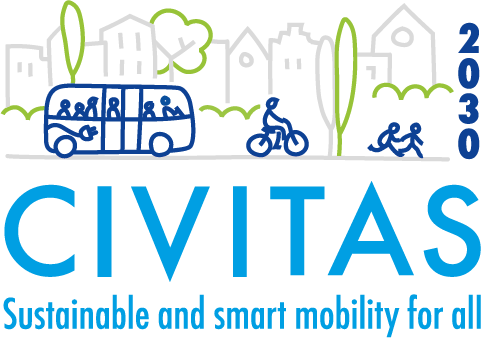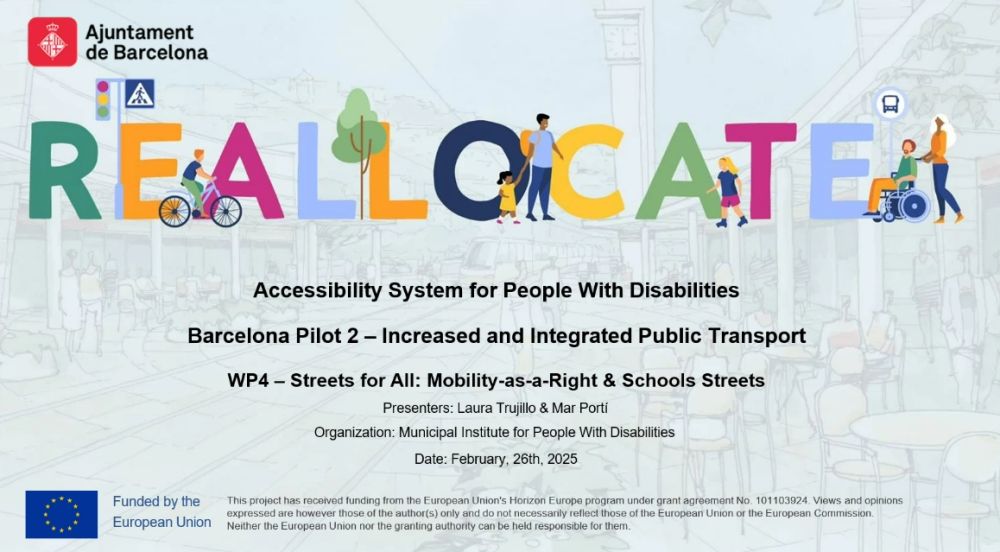
News
Part 1 - “Streets for All, Mobility as a Right & School Streets” Webinar Write up
19 March 2025
The joint REALLOCATE, UPPER and Just Streets webinar, “Streets for All: Mobility-as-a-Right & School Streets”, which brought together over 200 participants, focused on mobility rights, emphasising the concept of mobility as a fundamental right and the need for inclusiveness and accessibility in urban environments.
This first article as part of a three-part write-up, highlights Barcelona’s presentation on creating an accessible public transport system for people with disabilities. Presenters Laura Trujillo and Mar Portí from the Barcelona City Council and the Barcelona Municipal Institute of People with Disabilities (IMPD) shared the city’s progress in making public spaces and transport services more inclusive.
Stay tuned for the next parts of our webinar write-up, where REALLOCATE will explore Lyon’s approach to public space and street design for schools and an exchange on school street transformations in Warsaw and Kozani.
Barcelona Pilot 2 Barcelona’s Approach to Increased and Integrated Public Transport
Presented by: Laura Trujillo (City Council) and Mar Portí (IMPD)
Barcelona's commitment to accessibility is deeply engrained in its urban planning. The Barcelona Municipal Institute of People with Disabilities (IMPD), in place for over 40 years, is responsible for mainstreaming accessibility and the rights of people with disabilities through all of Barcelona’s municipal services and related activities, with the core aim of ensuring accessibility throughout the whole services chain.
Accessibility in Public Space
Laura Trujillo began the presentation by discussing how accessible pedestrian routes are designed in urban public spaces in Barcelona. The city’s approach to maximising accessibility involves imagining that a continuous ‘tunnel’ runs alongside all the avenues in the city, seamlessly connecting residents to all available means of transport and destinations. Every aspect of the streets— whether it be construction work, street furniture, or signage—is taken into consideration as a potential barrier to this aim. The goal is to enable everyone to navigate the city to facilitate autonomous and safe travel for all citizens
Progress in Implementing Public Transport Accessibility
The city has made significant progress in ensuring its public transport network is connected and accessible to all. Notably, all public buses in Barcelona are fully accessible, are fully equipped with ramps for wheelchair users and feature transport information provided in both audio and braille forms, at both the bus stops and onboard. Additionally, 93% of the city’s metro stations are recognised as being accessible, with new lifts installed to connect street level directly to the platforms—an essential change for improving access for people with reduced mobility.
Barcelona’s Special Transport Service
Barcelona also offers special transport services designed to cater to the specific needs of people with disabilities. The service operates on a fixed programme, with clear departure and arrival points, with 61 such routes in daily operation. This service is partially funded by the regional government. For more flexible trips that do not fit within the fixed routes, there is also a ‘sporadic’ taxi service available. Users simply need to book 48 hours in advance via a call centre or by sending an email. The taxis—500 trips daily—provide a crucial service for those with more specific transportation needs.
REALLOCATE Pilot 2 — Optimising Public Transport Through Shared Journeys
The final part of this presentation focused on pilot 2 of the REALLOCATE project, which focused on optimising public transport and implementing a technical and procedural system for shared journeys. Essentially, success would be met through having more users, without increasing the number of journeys and thus minimising fuel consumption.
Phase 1 of the pilot, has already been deployed involved extensive stakeholder mapping, engagement and the conducting of a stakeholder needs assessment, as well as workshops carried out to discuss with stakeholders how best to optimise the Special Transport Service.
The upcoming phase 2 will involve implementing a plan based on the data and knowledge collected from the first phase. This will include a detailed analysis of the current service, such as developing a descriptive map showing the service in full. Tied into this will be a comparative analysis of the Service, using best practices as benchmarks. Additionally, the development of a shared journey scheme for people with reduced mobility (PMR) will be tested, as part of a feasibility study aimed at further improving transport services.
Stay tuned for the next parts of our webinar write-up, where REALLOCATE will explore Lyon’s approach to public space and street design for schools and an exchange on school street transformations in Warsaw and Kozani.
Joint REALLOCAT, UPPER & Just Streets webinar (REALLOCATE)
All news

This project has received funding from the European Union’s Horizon Europe programme under grant agreement No. 101103924. Views and opinions expressed are however those of the author(s) only and do not necessarily reflect those of the European Union or the European Commission. Neither the European Union nor the granting authority can be held responsible for them.


REALLOCATE is a project under the CIVITAS Initiative, an EU-funded programme working to make sustainable and smart mobility a reality for all, and contributes to the goals of the EU Mission Climate-Neutral and Smart Cities.
